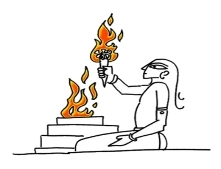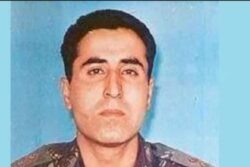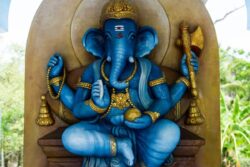Learn from Shiva

Both Shiva and Indra are immortal deities. Shiva’s immortality is achieved by tapasya; Kama, god of desire, is sacrificed during tapasya. Indra’s immortality is achieved through yagna performed to satisfy bhoga, the fulfilment of desire. As long as there is desire for bhoga, there will be yagna. Yagna demands sacrifice, bali. But bali has consequences which Indra, more often than not, cannot handle. Perhaps, this is why Shiva is worshipped while Indra is not.
 Indra churns the ocean of milk for amrita, nectar of immortality; along with it comes halahal, a poison that threatens to destroy the whole world. Indra wants to consume amrita but is unable to handle halahal. He does not know what to do with it. He offers it to Shiva who locks it in his throat, much to Indra’s delight. Shiva’s throat turns blue, a reminder that he can do what even Indra cannot. With this one deed, Shiva becomes Mahadeva, God who is greater than gods, while Indra remains deva, god.
Indra churns the ocean of milk for amrita, nectar of immortality; along with it comes halahal, a poison that threatens to destroy the whole world. Indra wants to consume amrita but is unable to handle halahal. He does not know what to do with it. He offers it to Shiva who locks it in his throat, much to Indra’s delight. Shiva’s throat turns blue, a reminder that he can do what even Indra cannot. With this one deed, Shiva becomes Mahadeva, God who is greater than gods, while Indra remains deva, god.
Every leader wants to generate amrita that will give him immortality. He is willing to perform a yagna and give a bali. But not every one is able to handle halahal. He cannot wish it away. Halahal is the husk of the grain, the garbage of the household, the pollutant of the industry. Managing it is critical, else it will return to haunt the yajaman, or head priest of the yagna.
Using every contact he had, with a sturdy business proposal, Vikram managed to secure the land to build a mini-township just outside the city. He visualised this as a place where young professionals could buy their weekend home. He also saw the possibility of opening up business centres, which could be a Special Economic Zone, in the future, which would boost BPO and KPO activities, due to the cheaper cost of living outside the city. When he revealed his plans to his brother and partner, Chandan, it was not met with a lot of enthusiasm.
Chandan said, “You are seeing the economic possibilities. But I can see a whole host of environmental and health issues that this project will bring in. The property is next to a protected mangrove forest on one side and a garbage dumping ground on the other. We can be in trouble for this. Besides, at least two villages may get affected by the roads that will have to be built over the years. Have you thought about that? We need to put in a team to manage all these issues!”
Vikram felt Chandan was dampening his enthusiasm and just being silly and perhaps, jealous. He went ahead with the project. All was well for three years. The buildings were up and ready to be occupied.
Permissions had been obtained when suddenly everything came to a halt. Public Interest Litigations were filed on environmental issues, media broke news of villagers being displaced, NGOs spoke of health hazards as the houses were too close to garbage dumping grounds.
Halahal had arisen. Vikram, the Indra, suddenly felt powerless. He begged Chandan to help. He needed a Shiva to control the poison that is a natural consequence of every development. Chandan wondered if the solution he forged would be systemic or merely cosmetic.








